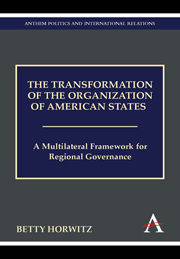 The Transformation of the Organization of American States
The Transformation of the Organization of American States Book contents
- Frontmatter
- Contents
- Prologue
- Glossary
- Chapter I The Role of the Organization of American States in the Promotion of a Multilateral Framework for Regional Governance
- Chapter II The Inter-American System: A History
- Chapter III The Emergence of Consensus Around Democratic Institutions and Shared Norms During the Period of 1991 to 2005
- Chapter IV Collective Security in the Western Hemisphere
- Chapter V Good Governance in the Western Hemisphere: The Unit for Promotion of Democracy, currently the Organization for Promotion of Democracy
- Chapter VI Conclusions
- Appendix A
- Appendix B
- Notes
- Bibliography
- Index
Chapter I - The Role of the Organization of American States in the Promotion of a Multilateral Framework for Regional Governance
Published online by Cambridge University Press: 05 March 2012
- Frontmatter
- Contents
- Prologue
- Glossary
- Chapter I The Role of the Organization of American States in the Promotion of a Multilateral Framework for Regional Governance
- Chapter II The Inter-American System: A History
- Chapter III The Emergence of Consensus Around Democratic Institutions and Shared Norms During the Period of 1991 to 2005
- Chapter IV Collective Security in the Western Hemisphere
- Chapter V Good Governance in the Western Hemisphere: The Unit for Promotion of Democracy, currently the Organization for Promotion of Democracy
- Chapter VI Conclusions
- Appendix A
- Appendix B
- Notes
- Bibliography
- Index
Summary
Introduction
More than fifty years after its creation in 1948, the Organization of American States (OAS) is undergoing significant transformations. Contrary to skeptical assessments of this organization, some analysts theorize that at the present historical juncture, the OAS may be emerging from its original role as a secondary instrument of US hegemonic power to become a relatively significant actor in promoting regional inter-state cooperation and consensus. Indeed, there is at least some evidence that indicates that the OAS is assuming new functions and acquiring new powers and, in the process, taking on a much more active role in setting the rules and agendas for regional governance in the hemisphere.
Any examination that deem the OAS as a significant instrument of cooperation and consensus always needs to take into consideration that there are also different views that regard any type of post-World War II effort to build a multilateral system largely as a failure. For instance, John O. Ikenberry (Ikenberry 1989) articulates his ambivalence toward the success of the multilateral efforts by the US in Europe to promote its particular brand of a postwar multilateral liberal system. According to Ikenberry, in spite of its hegemonic power, the US failed in its attempt to bring its own understanding of liberal multilateralism to European states and prevail upon them to create a grouping of western industrial democracies with a distinctive pattern of a deeper security association with the US (Inkenberry 1989, 376 and 395).
- Type
- Chapter
- Information
- The Transformation of the Organization of American StatesA Multilateral Framework for Regional Governance, pp. 1 - 16Publisher: Anthem PressPrint publication year: 2010


